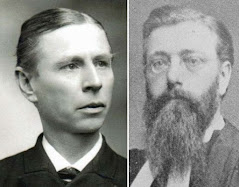An important letter in the history of the Missouri Synod was discovered while reviewing issues of
Der Lutheraner. It was written by the young Prof.
Franz Pieper to one of his favorite pastors,
Johann Heinrich Sieker of
St. Matthews in New York City, and it touched on topics pertinent to the matter of
Lutheran education in the United States
today. While the
Luther Classical College ramps up for its first season in 2025, it would do well to follow the early history of what would become
Concordia College, Bronxville. Although Casper, Wyoming is a
very long way from Bronxville, New York, yet its circumstances otherwise are identical.
This letter exhibits a
fondness that Pieper had for Pastor Sieker, a well known orthodox preacher in New York City. According to the
Christian Cyclopedia, St. Matthews joined the Missouri Synod in
1886, the year of this letter, and was instrumental in founding what would become Concordia College, Bronxville, New York (a college recently closed). This is the background for why Pieper wrote this letter.
The letter was not published until 45 years after it was written, 4 months after Pieper's passing on June 3, 1931. The Synod was still remembering its greatest teacher since the passing of its founding father, C. F. W. Walther. So the son of the well-known Pastor Sieker, who
succeeded his father as the pastor (who had passed way in
1904), dug out a letter from Dr. Pieper to his father to honor
both men.
Der Lutheraner editor Ludwig Fürbringer began this publication with a brief explanation. And what a lesson this letter provides for us today. — From
Der Lutheraner, vol. 87 (Oct. 20, 1931), p. 347 [EN]
:- - - - - - - - - - - - - - - - - - - - - - - - -
A letter from Dr. Pieper to Pastor J. H. Sieker in New York.
The letter, written forty-five years ago, was sent to us by the recipient's son, Fr. [Friedrich?] Otto Sieker.
St. Louis, Mo., January 20, 1886.
Dear Pastor!
I have just read the last issue of the [Lutheran] Witness and I feel compelled to write a few words to you. They should be words of encouragement. I am very sorry that the Progymnasium ["pre-high school"] in New York still receives so little attention on the part of our Eastern District; but don't lose heart because of this. It seems that the importance of such an institution has not yet been recognized in New York. This knowledge must and will come through God's grace, and then more, indeed all hands will take hold. I hope to God that there will be a full high school in New York soon.
.jpg) |
Concordia College, Bronxville
(earlier years, now closed) |
I am firmly convinced that a properly equipped high school (Realgymnasium [middle high school?]) would be filled from New York itself. Not only the children and young people from our congregations would attend, but also those parents who do not belong to our congregations but who recognize the value of a so-called classical education — and there are certainly a large number of such in New York — would entrust their sons to our high school. Watertown [of the Wisconsin Synod] has had very encouraging experiences in this regard. What an opportunity for us to evangelize among the educated! Even most of the outsiders are happy to take part in the religious instruction. A high school teacher who is a capable teacher and has a heart burning with Christian love has a tremendous influence on high school students [Gymnasiasten]. I say this partly from my own experience.- - - - - - - - - - - -
Concludes in Part 2 - - - - - - - - - - - - - -
It was a surprise for me that Pieper would say that most outsiders were "happy to take part in the religious instruction". That could be because the students attending were not entirely ignorant of the teachings of the Lutheran Church, more specifically of the faithful Old Missouri Synod.
And it was surprising to me how Pieper promotes the idea of non-Missourian, even non-Lutheran students coming to a Concordia educational institution. I sometimes have judged the LC-MS Concordia universities for their high percentage of non-Lutheran, even non-Christian, students. Pieper does not. He practically relishes these in order to “evangelize among the educated!” But what Pieper is assuming is that the “high school” or college will maintain a faithful “religious instruction”, and that pinpoints the heart of the downfall of the LC-MS higher educational institutions. When the theology in its flagship seminary, Concordia Seminary, St. Louis, has fallen, how then could its lesser institutions maintain their orthodoxy? As their history has shown in recent times, they did not, and could therefor no more "evangelize among the educated".
A search through 1885-1886
Lutheran Witness magazines in Google Books yielded only 1 reference to Pastor Sieker, but it was after the date of Pieper’s letter. So I could not provide a link to the article that Pieper references. However Pieper gives enough details for us to follow the particulars. — The concluding
Part 2, on monetary giving difficulties, follows next.

.jpg)


No comments:
Post a Comment
Comments only accepted when directly related to the post.